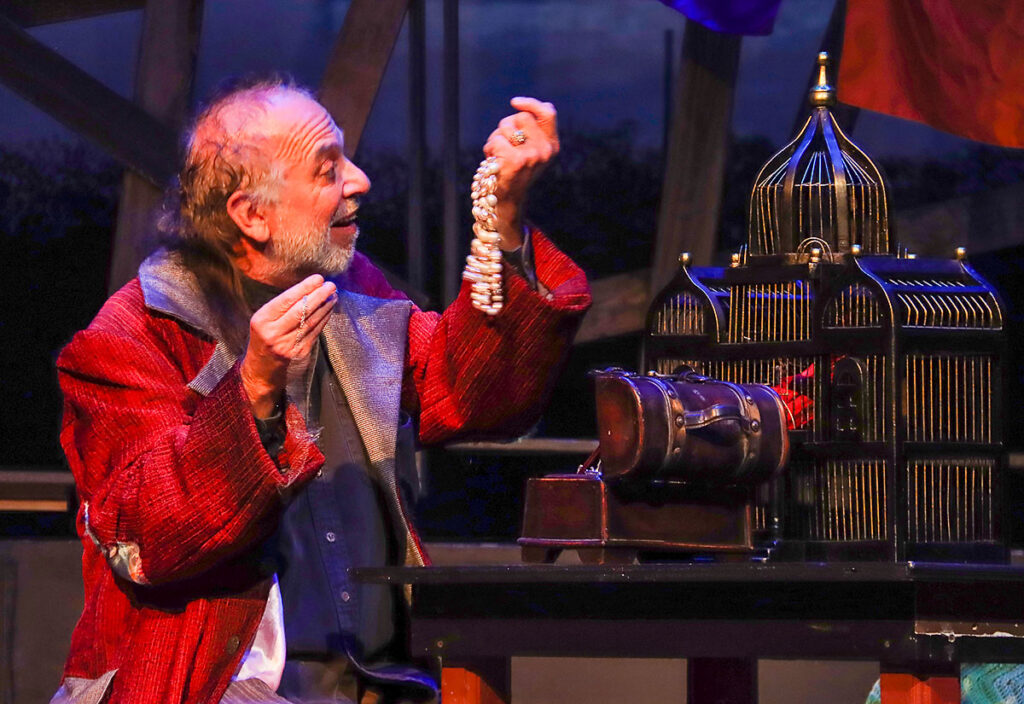Oliver!
Stockton Civic Theatre Puts a New Twist on a Dickens Christmas
- By Howard Lachtman
- Photographs by George Hong
- December 15, 2022
- 7:38 pm
- 3 Comments

Oliver!
Stockton Civic Theatre Puts a New Twist on a Dickens Christmas
by Howard Lachtman
Photographs by George Hong
Charles Dickens and Christmas are inseparable given the immortality of his beloved holiday story, “A Christmas Carol.”
First published in 1843, the timeless tale of miserly misanthrope Scrooge recovering his lost soul has become such a cherished part of Yuletide that the holiday would be incomplete without it. The story is a gift that keeps on giving and the name of the author himself is widely lent at this time of year to activities such as Dickens fairs, Dickens feasts, Dickens teas and Dickens collectors seeking new additions to their displays of Victorian miniature villages and figures.
Given this enduring popularity, it isn’t any wonder that theatregoers in search of a new Dickens delight have flocked to Stockton Civic Theatre this month to see if the author can once again warm their heats and earn their applause.
Those who assume that another “Carol” is in store for them are in for a surprise. Yes, “Oliver!” ably recreates the world of Dickens and his social concerns; and yes, a small boy wins our hearts by his struggle to survive adversity. But there the similarity ends, for the play is an adaptation of “Oliver Twist,” a novel about an abandoned orphan, set amid the poverty, deprivation and criminality of nineteenth-century London. Characters like pickpocket master Fagin (Jimmy Gonzales) and ruthless bully Bill Sikes (David Nelson) are mentors of the underworld who make Scrooge look like a choir boy.
The misadventures of our little hero begin in a workhouse, where he and his fellow sufferers have just cause to advertise their malnourishment in the show’s opening number, “Food, Glorious Food.” The portly, pompous Mr. Bumble (Tim Graffham) is a figure whose ample girth suggests where the food the boys deserve is actually going.
Escape to freedom sets Oliver on a troubled path that one can only hope will end as happily as the spiritual awakening of Scrooge or the “God bless us, every one!’ benediction of Tiny Tim. But in a world like this, one can’t be certain of a happy ending.

Running through December 18, the local production of Lionel Bart’s 1960 stage classic, directed by Martin Lehman, gains dramatic momentum as our anxiety for Oliver increases. The period piece atmosphere is enhanced by the costuming of Kathy Dixon and Cathy Fiore Hastings, and crowd scene choreography by Gianna Landin puts a lively hint of old London on the Stockton stage.
One of the pleasures of “Oliver!” is a musical score that evokes pleasant memories if you’ve ever hummed along with “As Long As He Needs Me,” “Consider Yourself,” “I’d Do Anything,” and “Where is Love?” These and other songs contributed to the Tony Award bestowed on Bart for his music and lyrics. Bart also authored the script, a noteworthy three-in-one achievement for a work that later took its share of Oscars for a 1968 film version that beat out “2001: A Space Odyssey” and “Funny Girl” for Best Picture of the year.

The fun begins as the ever-hungry boys of the workhouse give us a clear idea of the limitations of their gruel-based diets and pick Oliver as their representative to challenge the system. One wonders if he has the courage or the words to do so until he rises to ask “Please, sir, I want some more.” It’s an entirely reasonable request, but the authorities in charge of child exploitation are not inclined to indulge workhouse inmates with luxuries like a second helping, let alone anything like a balanced meal.
As punishment for his temerity, Oliver (engagingly portrayed by Brooklyn Richards) is sold to a mortician and designated as his apprentice. Escaping the mortality business, Oliver flees into the impoverished streets of the London slums, joins the ranks of light-fingered street urchins, and becomes a member of Fagin’s youthful pickpocket gang. His duties are defined by the song “You’ve Got to Pick a Pocket or Two.” It’s not the kind of trade that one imagines could inspire song, but there it is. If Bart was writing the show today he might be tempted to turn out a ditty entitled “What’s in Your Wallet?”
It isn’t all grim business, however. Oliver is guided by a merry pickpocketing pal named The Artful Dodger, brought to life by talented Alexia Cuevas, who ought to be considered for an Artful Acting Award. Oliver is warmly welcomed by the cheerful pickpocket lads in “Consider Yourself,” a spirited example of the show’s success in visual storytelling.
Once again, a live orchestra is in the pit, sparking the singing and dancing, with conductor Paul Kimball utilizing local musical talents to underscore both drama and lighthearted fare. The jolly celebrants of act two’s singalong opening number, “Oom-Pah-Pah” give us a welcome bit of fun and frivolity before we plunge back into the schemes of Fagin and the threats of Sikes, the perverse professors of Oliver’s street education.
Whether Oliver can somehow progress into a decent existence and claim a place in the world after the dreary oppression of the workhouse and the profession of “pickpocketry” is uncertain. But that doesn’t prevent us from indulging a Christmas wish that he will beat the odds and find a life worth singing about. He may even find a surrogate parent in the mother figure of kind-hearted Nancy (Emily Frantz) unless her sinister boyfriend has other plans.

Dickens himself did not learn about child exploitation and the netherworld of London by reading about it. He experienced his own ordeal after being abandoned by his parents to labor for two years in a workhouse factory. The novel he wrote at age 25 was the first of four in which he returned to the theme of youths lost in a world indifferent to their welfare, culminating in “Great Expectations,” a classic that lent itself to a 1975 musical stage adaptation by composer Cyril Ornadel with book and lyrics by Hal Shaper. One hopes that the tale of young Pip’s obsession, disillusion and redemption might someday be considered for adoption by the Stockton Civic Theatre as another gift for holiday theatergoers.
In the meantime, if you wish to immerse yourself in the world of Dickens, grab a ticket to one of the final SCT performances of “Oliver!” this week and discover what the author wished to convey to you through characters he knew all too well in the days of his youth.
###
Address: Stockton Civic Theater, 2312 Rosemarie Lane
Final Performances of “Oliver!”: Thursday-Saturday, 7:30 p.m. Sunday 2:30 p.m.
Tickets: Adults $31. Seniors (over 60) $26. Students $18.
Information: Box office: (209) 473-2424. Business Office: (209) 473-2400.
A retired reporter and editor, Stockton resident Howard Lachtman has written Delta-centered detective stories, Stockton Civic Theatre reviews and a variety of baseball tales for Soundings. In 2006. he was honored by the Stockton Arts Commission for “24 years of superior review and commentary on the performing and literary arts in Stockton.” He recently gifted his vintage baseball glove to a grandson who tried to play with it and asked “How did you ever catch a fly ball with a glove this small?” To which Howard responded, “I made frequent excuses.”
- By Howard Lachtman
- Photographs By: George Hong
- December 15, 2022
- 7:38 pm
- 3 Comments

Leave a Reply
3 Comments
Thoroughly enjoyed this wonderful production this holiday season. Your review brought it all back to me. Hoping to visit the Dickens Fair for more Victorian fun at Cow Palace next year.
What fun holiday reporting! I never read Oliver! but I hope to read it soon after your article. I love being transported to another era, especially to the Victorian age. It seemed like a joyous and engaging play for the audience!
I’m amazed at how much this summation of what we saw and marveled at on the stage of the Stockton Civic theater
conveyed in a few words.
Every character, the music, and what we saw on stage was brought to mind.
Howard Lachtman exhibits this talent in whatever he writes.
He’s not a word-waster.
Mel Corren